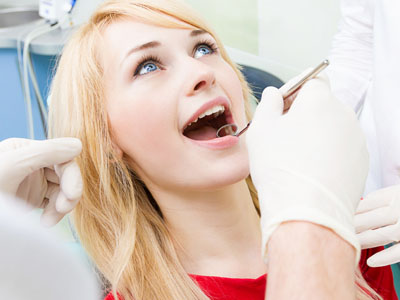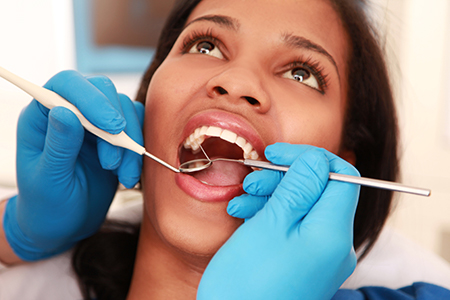
Our Office
1744 Fry Rd.
Houston, TX 77084
Existing Patients: (281) 492-8900
New Patients: (281) 213-5048
Fax: (281) 492–9337
Email: briterdental1744@gmail.com
Visit Us Online
At the office of Briter Dental, we take a forward-thinking approach to oral health: regular oral exams are the foundation for preventing problems before they start. Routine evaluations allow our team to track changes over time, catch early signs of disease, and tailor prevention strategies to each patient's needs. During an exam we combine a careful visual inspection with targeted diagnostics and patient education so you leave with a clear understanding of your oral health and practical next steps.
Your first oral exam with our team establishes a complete baseline. We begin by reviewing medical and dental histories to identify medications, medical conditions, or prior treatments that affect dental care. Understanding your goals and any concerns you may have helps us shape a personalized plan for examinations and preventive measures.
Next, the clinician performs a methodical clinical inspection of your teeth, gums, soft tissues, and jaw function. We look for signs of tooth decay, gum inflammation, abnormal wear patterns from grinding, and any tissue changes or lesions that warrant closer review. An oral cancer screening is included as a routine part of the exam so suspicious areas can be documented and monitored.
When indicated, diagnostic images are taken to see beneath the surfaces that a visual exam cannot reveal. Digital radiographs allow us to evaluate bone levels, detect hidden decay, and examine tooth roots and restorations with minimal radiation exposure. If bite or jaw alignment is a concern, we also assess occlusion and temporomandibular joint (TMJ) function.
At the conclusion of the visit we summarize findings in plain language, discuss preventive and treatment options, and recommend an individualized schedule for follow-up and maintenance. Our aim is to empower patients with information and a clear plan that fits their lifestyle and oral health priorities.

Oral health is tightly connected to overall health. Inflammatory conditions in the mouth, especially untreated gum disease, can influence systemic inflammation and have been associated with a range of health concerns. During an oral exam we not only search for local dental problems but also note signs that could point to broader medical issues.
Research continues to explore links between oral infections and conditions such as cardiovascular disease, diabetes, and respiratory problems. Detecting and controlling oral inflammation early helps reduce bacterial load and may lessen systemic impacts. For patients with chronic medical conditions, coordinated care between dental and medical providers is often beneficial.
Conversely, many systemic diseases produce oral symptoms. Dry mouth, persistent ulcers, or unusual oral lesions can be early indicators of underlying conditions or medication side effects. Because more than 90% of systemic diseases can have oral manifestations, routine exams play an important role in overall health surveillance and prompt referral when needed.
Prevention is the most effective and patient-friendly strategy for long-term oral health. Regular checkups paired with professional cleanings help control plaque and tartar, the primary contributors to cavities and periodontal disease. Even diligent home care can miss certain areas; professional hygiene removes hardened deposits and polishes enamel to reduce staining.
During hygiene visits our team provides individualized coaching on brushing, flossing, and adjunctive tools like interdental brushes or water flossers. We tailor recommendations by age, dental history, and any special circumstances such as orthodontic appliances, implants, or dry mouth. Education is practical and hands-on, so patients leave confident about daily home care routines.
For children, preventive visits establish good habits and let us monitor growth and development. Early visits help identify potential orthodontic concerns and allow interventions at the right time. For adults, ongoing maintenance preserves restorations and helps catch wear or bite changes before they progress into more complex problems.
We generally recommend routine checkups and cleanings at intervals that reflect each patient’s risk profile. The goal is consistent monitoring, early detection, and minimally invasive care whenever possible to protect both function and appearance.

Imaging is an essential complement to the clinical exam. Digital radiographs reveal tooth decay between teeth, assess bone height around teeth, and evaluate the integrity of existing restorations and root structures. Because images are captured and displayed quickly, they help clinicians make informed decisions during the appointment.
Digital radiography offers several advantages: lower radiation exposure compared with traditional film, immediate image availability, and the ability to store and share images securely in the patient record. These benefits support more efficient diagnosis and clearer communication with patients about recommended care.
In some situations, two-dimensional x-rays are not sufficient for complex diagnostics or treatment planning. When detailed spatial information is required, three-dimensional imaging such as cone-beam computed tomography (CBCT) can provide precise views of tooth roots, jawbone anatomy, and vital structures. This level of detail is especially valuable for implant planning, assessment of impacted teeth, and surgical evaluations.
The type of image we recommend depends on the clinical question. Small periapical films capture an entire tooth from crown to root and are ideal for examining root health or diagnosing localized problems. Bitewing films focus on the crowns of posterior teeth to detect interproximal decay. A full-mouth series combines multiple periapical and bitewing views for a comprehensive assessment.
Panoramic radiographs provide a broad two-dimensional overview of the jaws and are useful for evaluating eruption patterns, impacted teeth, and general jawbone condition. Cephalometric images are specialized profile views used primarily in orthodontic planning to analyze facial growth and jaw relationships.
When more refined anatomical detail is needed, CBCT supplies three-dimensional data that aids safe and predictable surgical and restorative care. Because these images reveal the precise relationship of teeth to nerves and sinuses, they support accurate planning for procedures such as implant placement or complex extractions.
Our clinical team selects imaging judiciously, balancing diagnostic value with the principle of minimizing exposure. Patients receive an explanation of the purpose and benefits of any recommended imaging so they understand how it contributes to safe, effective care.

Regular oral exams are the cornerstone of lasting oral health. At Briter Dental our approach blends careful clinical evaluation, appropriate imaging, and practical prevention strategies to keep patients comfortable and informed. If you have questions about what to expect during an exam or want guidance on scheduling a preventive visit, please contact us for more information.
Yes. We always welcome new patients and their families for care. Feel free to give us a call or reach out to us online to schedule a first visit or for any additional information on our office. We look forward to hearing from you!
Routine dental checkups and professional cleanings help ensure your smile remains in tip-top condition and that any developing problems receive the prompt care they require. While it's a good idea to schedule a checkup and cleaning twice a year, longer or shorter intervals between routine visits depend on your specific needs.
We understand that life gets complicated and busy, and for various reasons, you haven't been able to get to the dentist for care. Don't worry; it's always a good time to get back in touch with the health of your smile.
At Briter Dental, we offer skilled and compassionate care to address a wide range of dental needs. Whether you need a simple checkup and cleaning, restorations, periodontal treatment, root canal therapy, or the replacement of missing teeth to get your smile back into shape, we provide precise, gentle, stress-free treatment to give you a smile that is as beautiful as it is healthy.
Give us a call today; we're happy to address all your questions and concerns about getting your smile back in tip-top condition.
For pregnant women, practicing good oral care and seeing the dentist to maintain a healthy smile is considered an important component of prenatal care. Researchers have found that pregnancy not only increases the risk of oral health problems, but these problems may also lead to pregnancy complications. At the office of Briter Dental, we provide the skilled and compassionate care required to help expectant mothers keep their teeth and gums in tip-top condition. While certain procedures are not recommended during pregnancy, we provide the necessary care and take all the necessary precautions required.
Thanks to advances in modern dentistry, teeth that have been affected by a range of imperfections or that have sustained damage from trauma or dental decay can be restored to produce a naturally beautiful looking and functional smile.
As skilled and experienced providers of care, our office can effectively improve and enhance the appearance of teeth that are stained, discolored, misshapen, chipped, fractured, gapped, crowded, or broken down due to dental decay. At the office of Briter Dental, we offer a comprehensive selection of the leading-edge cosmetic solutions from teeth whitening procedures, dental bonding, tooth-colored fillings, and veneers, to prosthetic solutions and dental implants to rebuild complete and beautiful smiles.
Contact our office to learn more about the many ways we can help you create the smile you've always wanted.
If you're visiting Briter Dental for the first time, it is helpful that you contact your former dental office and have your records sent over to us. Make note of any problems you may have so that you can discuss them with your dentist.
To provide efficient service, we ask you to please bring your insurance card, an ID, plus any referral slips or diagnostic records given to you by another office. If you are taking medications, please note or make a list of what they are as you will need to provide that information.
Yes! We assure you that both you and your family will be in good hands at the office of Briter Dental.
We do our best to make sure every patient who steps into our office for care is put at ease. We provide precise and gentle care and our skilled, compassionate team strives to make every visit stress-free. You can rest assured that your smile is in the best of hands and that we are doing all we can to ensure your comfort throughout every procedure. While we always take the time to explain every step in care, feel free to ask us any questions about local anesthesia and methods of dental sedation.
At the office of Briter Dental, we strive to provide the highest quality of care to address all your dental needs. Once we've had the opportunity to examine your smile, we can give you a clear picture of any dental issues that are present, along with a quote for what the cost of treatment will be. The cost of care all depends upon the extent and complexity of issues affecting the health or appearance of your smile and the types of procedures that are required. Our goal is to make dental care more affordable so that you can begin treatment without any additional stress or delay.
Keep in mind that with routine dental checkups and periodic care, we can help prevent dental disease while treating emerging problems early in their onset to avoid larger issues and more expensive care down the road.
Routine dental checkups and preventive care procedures may be covered under your dental insurance plan requiring little to no out-of-pocket expense. We invite you to check our financial information page or give us a call to find out if our office participates with your plan, and if you have any other questions about dental insurance, dental savings plans, forms of payment, or financing options. We welcome your inquiries and do our best to help you begin care without additional stress or delay.
If you've lost a tooth due to injury, decay, gum disease, or any other reason, we recommend dental implants to replace missing teeth. Dental implants come the closest to replicating the look, feel, and function of your natural teeth.
Absolutely! Both flossing and brushing regularly are equally important to maintain your oral health. While brushing cleans the surface of your teeth, flossing cleans in between them. Flossing is important to prevent plaque buildup, which can cause gums to recede and lead to periodontal disease.
Even if you have dentures, it is still necessary to see a dentist! Dental checkups help ensure that your dentures are comfortable, fitting properly, and that there are no other problems. Beyond assessing your dentures, our dentist will also perform a thorough examination of the jawbone, and surrounding soft tissues both inside the mouth, the face, and neck, to confirm that you remain in good oral health.
Emergency dental care is a service we hope you'll never need- but if you do, the office of Briter Dental is here for you!
Whether you're suffering from a chipped tooth, toothache, or any problem affecting your oral health, you can be sure to get the prompt attention and compassionate care you require at our office. Patient care and comfort are our top priorities, and we offer a comprehensive range of the most advanced services to address a broad spectrum of dental needs.
While the pain of a toothache is one of the more common reasons that patients come to our office for emergency dental care, we also promptly treat emergencies that are not necessarily painful like crowns that have been dislodged and broken dentures that leave embarrassing gaps in one's smile.
You can rest assured that your oral health is in the best of hands at our office. We'll quickly determine exactly what's wrong, explain your treatment options, and then provide the precise and gentle care you require to alleviate your discomfort and get you back on the path to oral health and wellness.
Your health and comfort are our top priorities. If your dental emergency is painful, if it affects the appearance of your smile, or if you suspect that an infection is present, our office will make every effort to see you as soon as possible for care.
At the office of Briter Dental, we welcome patients of all ages for care and offer a comprehensive range of services designed to help every member of your family maintain a beautiful and healthy smile. Whether you or a loved one needs a routine checkup and cleaning, fillings, same-day crowns, a cosmetic smile makeover, the replacement of missing teeth or require the services of a skilled and compassionate emergency dentist, you can rely on our office for the highest quality care.
For more information on our office and the many services we provide, or to schedule an appointment for care, give us a call today.
Your initial oral exam begins with a review of your medical and dental history to identify medications, medical conditions and past treatments that affect dental care. The clinician conducts a systematic visual and tactile inspection of teeth, gums, soft tissues and jaw function to establish a baseline for future visits. An oral cancer screening and documentation of any tissue changes are included so suspicious areas can be tracked or referred promptly.
When indicated, digital radiographs or other targeted diagnostics are taken to reveal issues below the surface, such as hidden decay, root problems or bone loss. Bite and occlusion are evaluated for wear patterns and functional concerns, and the clinician discusses findings in plain language. At the end of the visit you receive a personalized prevention and treatment plan tailored to your goals and risk profile.
Frequency of oral exams is based on each patient's individual risk factors rather than a one-size-fits-all interval. Many patients with low risk maintain oral health with exams every six months, while those with active periodontal disease, heavy decay risk or certain medical conditions may need more frequent monitoring. Children, patients undergoing orthodontic care and people with complex restorations often require a customized schedule to support growth and treatment needs.
Your dental team will recommend a recall interval after assessing your oral health, hygiene habits and medical history, and this schedule may change over time as conditions improve or new concerns arise. Regular exams allow timely adjustments to prevention strategies and reduce the need for extensive treatment. Consistent follow-up is the most effective way to preserve function and appearance long term.
A thorough oral exam combines careful clinical observation with selective diagnostics to provide a full picture of oral health. Common tools include periodontal probing to measure gum health, digital bitewing and periapical radiographs to detect interproximal decay and root issues, and intraoral cameras to magnify and document areas of concern. Vitality testing and visual documentation help differentiate between reversible and irreversible conditions.
Advanced imaging such as panoramic radiographs provides a broad overview of the jaws and erupting teeth, while cone-beam computed tomography is reserved for cases that require three-dimensional detail, such as implant planning or complex surgical assessments. The clinical team selects tests that answer specific diagnostic questions while minimizing radiation exposure. All recommended diagnostics are explained so patients understand their purpose and how they guide care.
Oral cancer screening is a standard component of routine exams and involves both visual inspection and gentle palpation of the mouth, throat and neck. Clinicians look for persistent ulcers, unusual lumps, color changes or textured patches and record any findings for comparison at subsequent visits. When a suspicious lesion is identified, the clinician documents its size and location, monitors for changes, and refers for biopsy or medical evaluation if warranted.
Risk assessment for oral cancer includes reviewing tobacco and alcohol use, HPV exposure and other contributing factors, and patients are counseled on signs to watch for between visits. Early detection dramatically improves outcomes, so consistent screening and prompt follow-up are essential. The aim is to catch abnormalities at the earliest possible stage and coordinate timely care with appropriate specialists.
Oral health and systemic health are closely linked; inflammation and infection in the mouth can have effects beyond the oral cavity. Conditions such as periodontal disease are associated with systemic inflammation and have been linked in research to cardiovascular disease, diabetes control and respiratory health, making regular dental evaluations an important part of whole-body wellness. During exams clinicians also look for oral signs that may indicate undiagnosed or poorly controlled medical conditions, such as dry mouth, persistent ulcers or unusual mucosal changes.
For patients with chronic medical conditions, coordinated care between dental and medical providers often improves outcomes by aligning treatment goals and medication management. Preventing and controlling oral inflammation lowers bacterial burden and can reduce the risk of systemic complications. Oral exams therefore serve both to protect teeth and gums and to contribute to broader health surveillance.
Bring an up-to-date list of medications, including over-the-counter supplements, and note any changes in your medical history since your last visit. Inform the team about recent hospitalizations, chronic conditions, pregnancy status or any therapies that might affect dental care, such as radiation or immunosuppressive medications. If you have recent dental x-rays from another provider or questions about specific concerns, mention them at check-in so the team can integrate that information into your exam.
Prepare a brief list of symptoms or goals to discuss during the visit, such as sensitivity, bleeding, bad breath or cosmetic concerns, and be ready to describe your home care routine. Open communication helps clinicians tailor advice and interventions to your lifestyle and priorities. Clear information from patients enables more accurate risk assessment and more efficient, personalized care planning.
The choice between two-dimensional radiography and three-dimensional imaging depends on the clinical question at hand and the level of anatomical detail required. Bitewing and periapical radiographs are sufficient for routine caries detection and root assessment, while panoramic images provide a broad overview of eruption and jaw relationships. Cone-beam computed tomography is reserved for complex diagnostics and treatment planning where precise spatial relationships, such as nerve position for implant placement, must be known.
Clinicians weigh diagnostic benefit against radiation exposure, selecting the least invasive modality that answers the clinical question. When advanced imaging is recommended, the purpose and expected value are explained so patients understand how it contributes to safer, more predictable care. This judicious approach supports accurate diagnosis while maintaining patient safety.
Preventive recommendations are individualized and may include professional hygiene appointments, targeted home care instructions and adjunctive therapies like fluoride applications or antimicrobial rinses. For children and adolescents, sealants and growth monitoring are common strategies to prevent decay and identify orthodontic needs early. For adults, guidance may focus on preserving restorations, managing dry mouth or addressing wear from grinding with night guards and bite adjustments.
Education is an integral part of each visit, with hands-on coaching for brushing and interdental cleaning techniques tailored to the patient's anatomy and appliances. The clinical team establishes a recall schedule that reflects risk and treatment needs to ensure consistent monitoring. Preventive care aims to minimize invasive treatment and maintain both function and esthetics over time.
Yes. A comprehensive oral exam includes assessment of jaw movements, joint sounds, muscle tenderness and occlusion to identify early signs of temporomandibular joint dysfunction or bite-related issues. Clinicians observe chewing patterns, check for limited range of motion, and look for wear facets, chipping or uneven restorations that indicate functional stress. Documentation of baseline findings enables the team to monitor progression and intervene before problems become severe.
If clinical findings suggest a functional disorder, the team discusses conservative management options such as behavior modification, occlusal appliances, physical therapy referrals or targeted restorative adjustments. Imaging or specialist consultation may be recommended for persistent or complex cases. Early recognition and coordinated care help preserve joint health and prevent long-term damage.
Follow-up after an exam typically centers on the individualized plan created during the visit, which may include scheduled hygiene visits, specific restorative or periodontal treatments, and monitoring of any areas of concern. Patients receive clear instructions about recommended home care, timing for recall appointments and signs that should prompt earlier evaluation. Documentation in the patient record allows clinicians to track changes over time and tailor maintenance accordingly.
If additional treatment or specialist referral is needed, the dental team explains next steps and coordinates care to ensure continuity and clarity. For questions or to schedule recommended appointments, patients are encouraged to contact Briter Dental so the team can support ongoing prevention and treatment. Long-term maintenance emphasizes regular monitoring, early intervention and patient education to protect oral health across the lifespan.